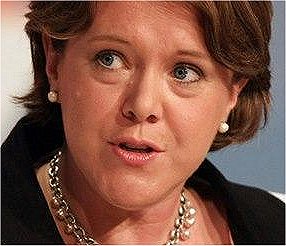for diverse, democratic and accountable media
The Miller's tale
blog posts |Posted by Jonathan Heawood

Maria Miller (pictured) has been found culpable by an MPs' committee of over claiming expenses on her London home, and of failing to co-operate with the committee's inquiry. She has been asked to apologise to the House of Commons and she has duly apologised, albeit tersely. Her political fate hangs in the balance.
Journalists at the Daily Telegraph, who have made MPs' expenses their business, claim that Miller's 'heavies' warned them off the story because Miller was the minister responsible for implementing Leveson. At least one spin doctor has denied this.
The former editor of the Telegraph, Tony Gallagher, has argued that the story illustrates the dangers of giving politicians any role in press regulation. Even if the facts of this matter are in dispute, his principle is right: politicians cannot be trusted to have any role in the regulation of the press. The principle would be relevant to the Miller's tale if politicians did actually have any role in the Leveson-recommended system of press regulation. The problem for his argument is they don't. This is perhaps why, as Michael White has commented on the Guardian's Politics Blog, Gallagher was unconvinced and unconvincing when he sought to use Mrs Miller as a stick to beat Lord Justice Leveson.
The Royal Charter on Self-Regulation of the Press, for which Miller was passingly (and unhappily) responsible for “granting and sealing" , does not give politicians a role. In fact, it gives the press (through the associated legal protections in the Crime and Courts Act) greater freedom to speak truth to power – to attack politicians and others without the chilling effect of libel threats. The Charter does not appoint a regulator or stipulate the contents of a regulatory code, other than by requiring some general, and uncontroversial, headings. These headings do not include a ban on political reporting. The Charter is triple-locked against future political interference. And it makes clear that politicians should not sit on the board of the regulator.By contrast, IPSO, the regulator developed by Lord (Guy) Black – Executive Director of Gallagher's former employers, Telegraph Media Group (here's the arse-kissing) – is peopled by political peers. It is owned and controlled by the newspaper industry. It will not provide much in the way of arbitration and can therefore offer its members no protection against libel or privacy threats.
So what is the moral of this tale? It is in fact the same moral that Leveson drew 18 months ago: that regulation should be doubly protected, against both press and political interference. Only IMPRESS, the Independent Monitor for the Press, which I have set up with the backing of Sir Harold Evans and other journalists and free speech campaigners, can offer that double guarantee of independence.
By supporting our crowdfunding appeal, you can actively contribute towards a future in which politicians – regardless of whether they fiddle their expenses – and newspaper owners – regardless of whether they profit from activities like phone hacking – have no power over press regulation: a future in which, for the first time, the public are in the driving seat.
Jonathan Heawood is Founding Director of The IMPRESS Project
Follow The IMPRESS Project on Twitter: @impressproject
First published on Informm and reposted with kind permission.
DATELINE: 20 June, 2014
Share

 be the first to comment
be the first to comment